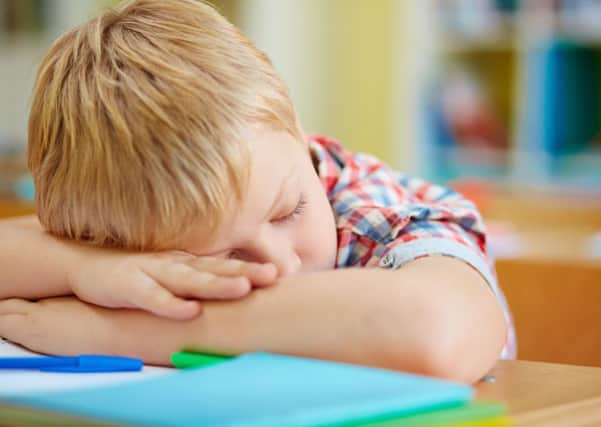Sleep shortage for children ‘could make them obese’


A new poll for the British Nutrition Foundation (BNF) found 43 per cent of adults sleep less than the recommended minimum of seven hours a night.
But the figures surrounding younger children and teenagers were even more alarming, with 32 per cent of primary and 70 per cent of secondary school pupils sleeping for less than nine hours – the absolute minimum they should get. The survey covered more than 6,000 primary and secondary school children and just over 1,500 adults.
Advertisement
Hide AdAdvertisement
Hide AdResults showed that 80 per cent of adults and 50 per cent of secondary school students reported waking up at least once during the previous night.
Screens may be to blame for disturbed sleep, the poll suggests. Of those surveyed, 59 per cent of secondary school pupils, 50 per cent of adults and 49 per cent of primary school children said they used a screen before bed on the previous night.
Some adult respondents also had high intakes of caffeine and alcohol.
The poll looked at breakfast habits and found that a quarter of secondary school pupils did not eat breakfast on the day of the survey. One in ten primary children also said they had skipped their morning meal. Only 18 per cent of secondary school students reported including any fruit or vegetables in their first meal of the day.
Dr Lucy Chambers, senior scientist at the BNF, said: “The implications of a bad night’s sleep can go much further than feeling tired.
“Where lack of, and disturbed, sleep can lead to both adults and young people feeling grumpy and irritable, regular poor-quality sleep can have a negative impact on dietary choices, including higher intakes of calories and more frequent snacking on less healthy foods.
“The BNF’s Taskforce report, published earlier this year, highlighted that lack of sleep and interrupted sleep may be linked to an increased risk of heart disease, stroke, Type 2 diabetes, obesity and hypertension.”
It has been revealed the cost of getting a good night’s sleep in Scotland has tripled in the past two decades, with nearly £10 million spent by the NHS on sleeping pills alone last year.
Advertisement
Hide AdAdvertisement
Hide AdSchools in Dumfries and Galloway and Midlothian have been among those to partner with charity Sleep Scotland to teach pupils about the value of getting enough shuteye.
One primary school in Stirling that took part in a pilot last year reported a dramatic boost in pupils’ behaviour and attendance at school.